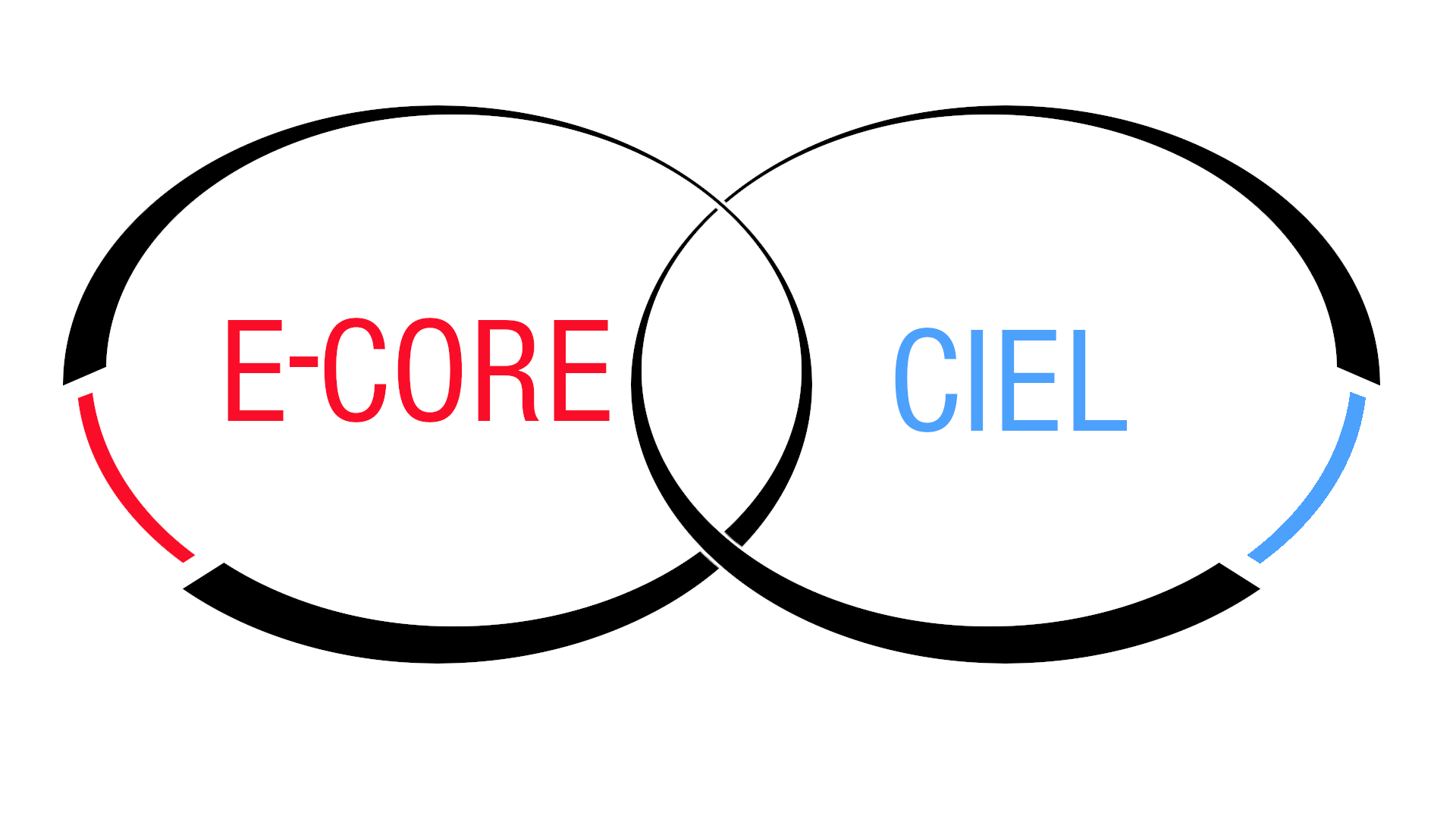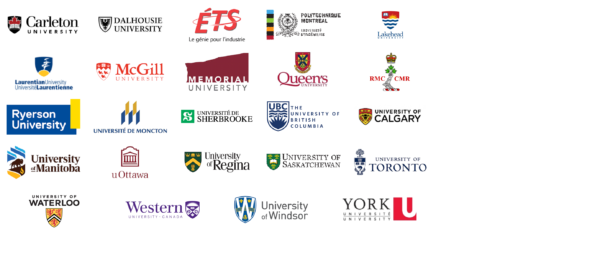About

Project Overview
The Engineering Collaboration for Online and Remote Education / Collaboration pour l’ingénierie enseignée en ligne (E-CORE/CIEL) Project was launched in March 2020 as a national response to the COVID-19 pandemic, which forced an abrupt, global shift to online and remote education. It is funded by Engineer Deans Canada(EDC), with collaborative support from a number of national engineering education initiatives including:
- Canadian Engineering Education Association – Association Canadienne de l’Éducation en Génie (CEEA-ACEG),
- Engineering Graduate Attributes Development Project (EGAD),
- Canadian Engineering Education Challenge (CEEC),
- Engineering Change Lab (ECL),
- Institute for Engineering Teaching (IET),
- Institute for Engineering Education Research (IEER).
Over the last year and a half we have partnered with these and other national groups to produce a variety of events, resources, and other supports for engineering educators across the country. It has been our priority to respond with agility and pivot our operations as needed to adapt to the changing needs of the community and emerging issues during this challenging time. Our mandate has also expanded from providing support in the wake of a crisis to exploring emerging opportunities for the advance of engineering education, and the project will culminate in the fall of 2021 with a number of reports and recommendations that will provide momentum for further growth in the engineering education community.
This web platform supports our current initiatives, and is accessible for anyone to explore.
E-CORE/CIEL is grateful to the 23 member institutions of Engineering Deans Canada who have provided funding for the project in 2021:

Our Beginning
In March of 2020, the Covid-19 Pandemic presented engineering programs in Canada with the daunting challenge of shifting abruptly to remote delivery of all undergraduate engineering programs in the middle of the winter term. Individual instructors were creative and resourceful in completing their courses in whatever way was possible given that both students and faculty members were in the process of relocating unexpectedly and dealing with changing life obligations under a national lock down.
It soon became clear that it would be necessary moving forward to prepare for a variety of remote program delivery scenarios, with approaches that maintained the standards defined by the CEAB (Canadian Engineering Accreditation Board). The available preparation time to rise to this challenge ranged from a few months for those readying for the fall term, to none at all for those who have year round co-op and offer summer terms.
A national collaborative initiative providing support and resources to all engineering educators in Canada was deemed absolutely essential, and the E-CORE/CIEL Project was created. Our first action was to conduct a national survey in order to identify priority needs. The results were used to plan the development of resources and supports that have been delivered on an ongoing basis.
In order to effectively communicate the goals, resources, and activities of the Initiative, a Logic Model was developed. The Project Framing and Logic Model document provides an overview of the targeted short-, medium-, and long-term outcomes for the E-CORE project. Though we have been operating in a dynamic and rapidly changing environment, the framing itself is still relevant, and can be viewed in our Project Framing and Logic Model document.
Here are some highlights of our activities to date:
- 15 Events with 470+ attendees (recordings available)
- Participants across all activities from 30+ different institutions
- 2 active bi-weekly Communities of Practice (CoPs) with more than 40 active members
- 2 regular communication newsletters with 1,300+ subscribers
- 27 Resource Documents developed and hosted, with 14 available in both French and English and translations of the others underway
- 25+ links to open online material
- 4,200+ views of E-CORE/CIEL website
Our Present
E-CORE/CIEL’s initial mandate was to provide support in the wake of a crisis, but it has been expanded to include the exploration of emerging opportunities for the advancement of engineering education in the wake of this massive forced educational experiment. The result is a number of sub-initiatives:
Support Operations
These activities continue to respond to instructor needs as our community faces continuing challenges and encounters new problems with the introduction of hybrid learning. Our present offerings include:
- Communities of Practice, which provide space for educators to come together on a regular basis to discuss challenges, celebrate successes, and share resources related to key topics in online and hybrid education.
- Events, including webinars and workshops designed to support you throughout the semester (with past webinar recordings available on the Webinar Recordings page).
- Resources, in the form of E-CORE Quick Guides, Guides, & Checklists, webinar recordings, and Open Educational Resource (OER) Course Material Links, that you can use in designing and improving your online and remote instructions for any type of course.
- Project Updates, where you can view all previous E-CORE/CIEL Project Updates to see how we’ve evolved and what has been added over time.
CIEL
The CIEL group was founded in the summer of 2020 to provide a space for francophone educators to work collaboratively on issues pertinent to their institutions. They have made significant contributions to our resources, and continue to operate and undertake various projects to support and improve a variety of aspects in engineering education. More about this group can be read on their About Us page.
Engineering Education Research Funding Position Paper
At the Fall 2020 Engineering Deans Canada meeting, the NSERC President invited the submission of a Position Paper making the case for funding dedicated to engineering education research (EER). In response to that invitation, the EDC Education Committee tasked the E-CORE/CIEL Project to coordinate community leaders in writing this paper.
We have developed a working group of individuals from a variety of institutions (including U of T, Queen’s, U Calgary, MUN, York, U Waterloo, and U Alberta) who have agreed to assist in the creation of this report, most of whom are members of the CEEA-ACEG Developing Engineering Education Research Capacity Special Interest Group (SIG). An initial outline of the paper was generated in collaboration with several members of the working group, and we plan to continue working with the full group, and other interested individuals, to complete the position paper by the end of the summer. We are working with the EDC Education Committee to plan a strategy for presenting this paper to NSERC and SSHRC to make the case for securing dedicated funding avenues for engineering education research.
Catalyzing the National Ecosystem of Engineering Education Initiatives
Part of E-CORE/CIEL’s mandate is to help catalyze the national ecosystem of engineering education initiatives in a way that allows the ecosystem to blossom so that it is self-sustainable, informs its own growth, and facilitates the spread of innovation within engineering education in Canada. To achieve this goal, the project is driving a systematic research approach to bring leaders and influencers together to coordinate the national ecosystem of initiatives, which you can read more about here.
Our Values
From day one, we have established a number of principles that continue to guide our approach for all our various initiatives, which include:
- Informed by research from relevant higher education change management literature
- Linked to longer term objectives to ensure utility and relevance beyond current pandemic circumstances
- Urgent and agile, given the time constraints to rapidly act, but pivot and iterate as necessary
- Applying a systems level focus to account for complexity and different interconnected frames of the Canadian Engineering Education system
- Collaborative: working with the willing, with outcomes accessible to all engineering educators in Canada
This multi-faceted approach helps to ensure that the efforts of the Project are robust, consistent, and useful beyond pandemic circumstances.
Our Future
The E-CORE/CIEL Project has been a demonstration of what can happen when high-quality coordination resources are made available to produce resources and generate supports in a time of crisis. The Project is funded to the end of 2021, and we do not have plans to continue, but rather use the momentum we have generated and integrate it into our Catalyzing the National Ecosystem of Engineering Education Initiatives work (see above) to improve the system as a whole. We are using our remaining time to find ways to incorporate our various operations and initiatives into the ecosystem so the community can continue to benefit from the resources and groups that have been created. We will continue to clearly communicate our plans as we work with our partners to contribute to the future of Canadian engineering education initiatives to the best of our ability.
